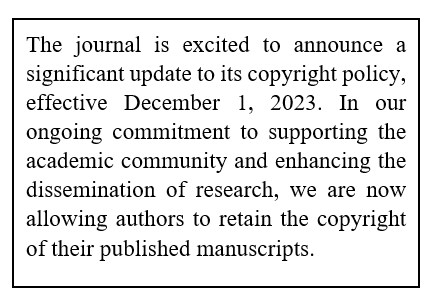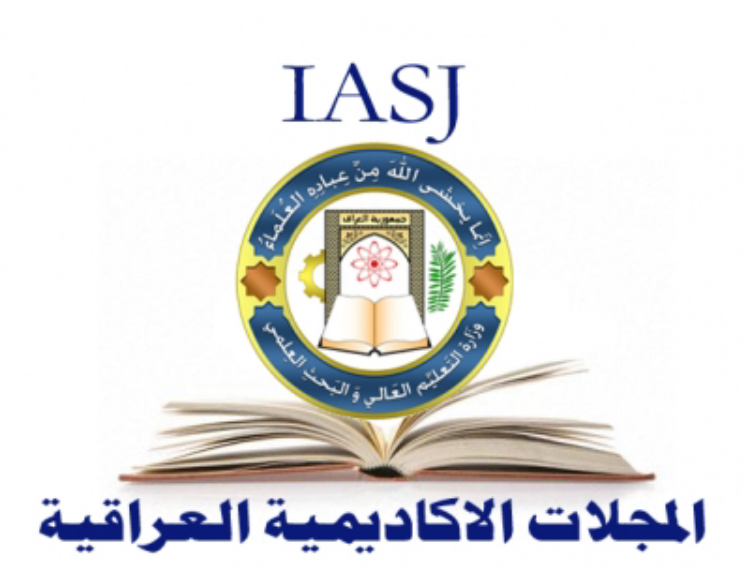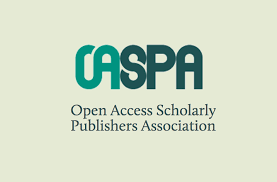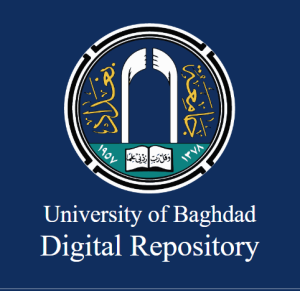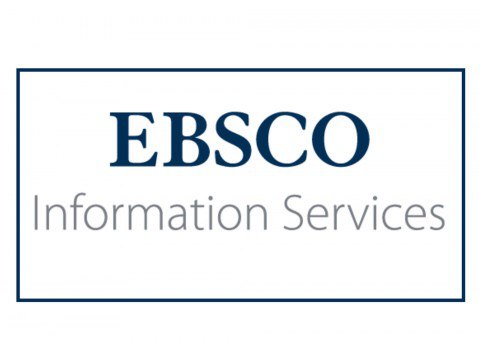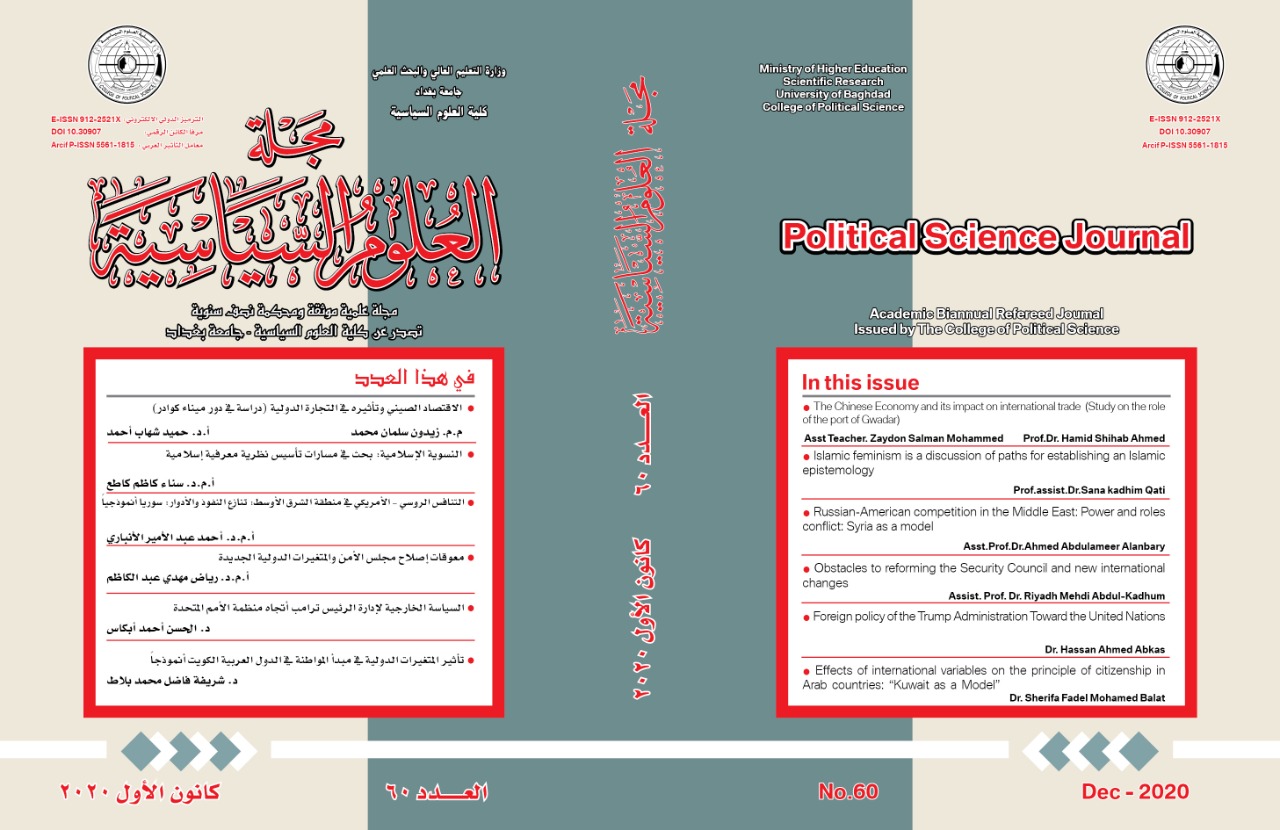The application of smart power in the regional power struggle in the Middle East after 2011
DOI:
https://doi.org/10.30907/jj.v0i62.589Keywords:
smart power, conflict, regional powers, Middle eastAbstract
Receipt date:12/7/2020 accepted date:24/1/2021 Publication date:31/12/2021
 This work is licensed under a Creative Commons Attribution 4.0 International License.
This work is licensed under a Creative Commons Attribution 4.0 International License.
The constant characteristic of international relations is the constant change due to political, economic and military developments in addition to technology, and this in turn has led to many transformations in the concept of power, its uses, and the elements that form power and its distribution, and according to those variables, the concept of power has shifted from hard to soft, up to smart power and its uses in politics. Foreign Affairs in a new framework based on the strategy of combining the hard and soft forces and their various tools (material and moral) according to the facts required by the situation. The use of smart power is no longer the preserve of major international powers Regional powers have used smart power, especially at the level of conflict among themselves, in order to face challenges and achieve their interests in the region and not allow other powers to obstruct their strategy, especially in the Middle East region, which is characterized by turmoil, instability, high competition and increasing conflicts in it, whether between regional powers or between international powers
References
أولاً: الكتب
1- أمين هويدي, التحولات الاستراتيجية(البروسترويكا وحروب الخليج الأولى), دار الشروق, مصر,1997.
2- العربي بجيجة, شذرات مع الصراع الجيو- استراتيجي في الشرق الأوسط وشمال أفريقيا, المركز الديمقراطي العربي, المانيا, 2017.
3- زياد عبد الرحمن فتحي الكوراني , رؤية جيوستراتيجية لمستقبل الصراعات الاقليمية في منطقة تزاحم الاستراتيجيات, دار امجد , عمان , 2017.
4- عبدالحليم خدام, التحالف السوري الإيراني والمنطقة, دار الشروق, مصر, 2010.
5- محمد حمدان, القوة الناعمة وإدارة الصراع عن بعد, مركز حمورابي للبحوث والدراسات الاستراتيجية, بغداد, 2013.
6- بشار بصرو شيخ علي, التسوية السلمية للأزمة السورية في ضوء موازين القوى الإقليمية والدولية, المركز الديمقراطي العربي للدراسات الاستراتيجية والسياسية والاقتصادية, المانيا, 2019.
7- حمد محمود عيسى وآخرون, تداعيات التدخل الدولي في إقليم الشرق الأوسط على ظاهرة الارهاب(سوريا, العراق, ليبيا, اليمن) انموذجاً, المركز الديمقراطي العربي, المانيا, 2020.
8- احمد سعيد نوفل واخرون , التداعيات الجيوستراتيجية للثورات العربية , المركز العلمي للأبحاث والدراسات السياسية, بيروت, 2014.
9- جهاد عودة, الصراع الدولي مفاهيم وقضايا, دار الهدى, القاهرة, 2005.
10- عبد القادر دندن, الادوار الاقليمية للقوة الصاعدة في العلاقات الدولية (دراسة ميدانية الصين), مركز الكتاب الاكاديمي, عمان, 2015.
11- محمد سليمان الزواوي, مثلث النفوذ الشرق أوسطي(السعودية-تركيا-إيران تفاعلات القوة الإقليمية بعد الربيع العربي), مركز الفكر الاستراتيجي للدراسات, اسطنبول, 2020.
12- عبد الزهرة صاحب علي, الدور الإقليمي الإيراني (الفرص والتحديات), بيت الحكمة, بغداد, 2019.
13- فراس محمد احمد الجحيشي, التوازنات الاستراتيجية الجديدة في ضوء بيئة امنية متغيرة, الاكاديميون للنشر والتوزيع , عمان , 2015.
14- عمر كامل حسن, المجلات الحيوية الشرق اوسطية الاستراتيجية الايرانية, مراجعة و تقديم: عطا الله سليمان, الدار العربية للعلوم الناشرون, بيروت, 2015.
ثانياً: الرسائل و الأطاريح
1- دابيا دهيبة وأكلي محفوظ, دور استراتيجيات القوى الإقليمية والكبرى تجاه الحراك في منطقة الشرق الأوسط(2011-2016 سوريا نموذجاً), رسالة ماجستير, جامعة مولود معموري, كلية الحقوق والعلوم السياسية, الجزائر, 2017.
2- أيوب دهقاني, أهمية الوساطة في حل أزمات النظام الإقليمي العربي: دراسة في امكانية قيام دور جزائري لحل الخلافات السعودية الايرانية, مجلة العلوم القانونية والسياسة, مجلد10, العدد1, 2019.
3- التجاني دلال وبولوسه سارة, التدخلات الإقليمية في الأزمة السورية(دراسة حالة إيران- تركيا), رسالة ماجستير, جامعة الشهيد حمة لخضر بالوادي, كلية الحقوق والعلوم السياسية, 2017.
4- محمد الطاهر عديلة , تطورات الحقل النظري للعلاقات الدولية , اطروحة دكتوراه , جامعة الحاج الخضر , الجزائر , 2015.
5- احمد سليمان سالم الرحاحلة, الدور التركي الجديد في منطقة الشرق الاوسط ,(الفرص –التحديات), رسالة ماجستير, جامعة الشرق الاوسط, كلية الآداب والعلوم,2017.
ثالثاً: الدوريات والمجلات
1- خضر عباس عطوان وحسين نيسان, تحولات القوة واتجاهات الصراع في النظام الدولي, مجلة المستقبل العربي, العدد472, حزيران, 2018.
2- هاني خلاف, العالم العربي: تحديات جديدة واستجابة منقوصة, مجلة شؤون عربية, القاهرة, العدد156, 2013.
3- أحمد مشعان النجم, البيئة الإقليمية في المدرك الاستراتيجي الإيراني وعلاقتها بمعيار القوة, مجلة جامعة الأنبار للعلوم القانونية والسياسية, المجلد 10, العدد 1, 2020.
4- عبد الغفار عفيفي الدويك, الاتجاهات الحديثة في إدارة الأزمات الدولية الشرق الأوسط نموذجاً, المجلة الدولية لأبحاث الأزمات, مجلد1, العدد التعريفي, الرياض, 2017.
5- وسام شاكر السراي, عسكرة الصراعات في عالم القوة الناعمة, مجلة أبحاث استراتيجية, العدد12, بغداد, 2016.
6- شيماء محمد عبد الله ابو عامر, التحولات الاقليمية في الشرق الاوسط واثرها على القوة الاقليمية لإيران, مجلة مدارات ايرانية, المركز الديمقراطي العربي, المانيا, العدد الاول, 2018.
رابعاً: الانترنت
1- محمد بن سعيد القطيبي, مستقبل الشرق الأوسط بين هيمنة المحاور وتدخلات القوى الإقليمية, https://raialyoum.com
2- خالد عليوي العرداوي, دور القوة الناعمة في إعادة تشكيل الشرق الاوسط(العراق وسوريا نموذجاً), مركز الدراسات الاستراتيجية, جامعة كربلاء, 2018, https://mannbaa.org
3- لمياء محمود, الأمن العربي القومي كجزء من الأمن الإقليمي الشرق اوسطي(الأخطار وأدوار الفاعلين), المركز الديمقراطي العربي, 2017, https://democraticac-de
4- نانيس عبدالرزاق, تأثير العقوبات الدولية على النظام الإقليمي في الشرق الأوسط, المركز القومي لدراسات الشرق الاوسط, https://ncnues-org/nede/365
5- احمد سمير القدرة, القوى الاقليمية وصراع السيطرة والهيمنة , جريدة دنيا الوطن الالكترونية, 2007, https://www.Pulpitalwatanvoice.com
6- عمر الحسن, قراءة في كتاب القوى الاقليمية في الشرق الاوسط, اعادة التشكيل بعد الثورات العربية, مركز الجزيرة للدراسات, 2015, https://www.studies.aljazeera.net
Sources
First: the books
1. Amin Huwaidi, Strategic Transformations (Perestroika and the First Gulf Wars), Dar Al-Shorouk, Egypt, 1997.
2. The Arab of Bejija, Fragments with the Geo-Strategic Conflict in the Middle East and North Africa, The Arab Democratic Center, Germany, 2017.
3. Ziad Abdel-Rahman Fathi Al-Kourani, a geostrategic vision for the future of regional conflicts in the area of contention of strategies, Dar Amjad, Amman, 2017.
4. Abdel Halim Khaddam, The Syrian-Iranian Alliance and the Region, Dar Al-Shorouk, Egypt, 2010.
5. Muhammad Hamdan, Soft Power and Remote Conflict Management, Hammurabi Center for Research and Strategic Studies, Baghdad, 2013.
6. Bashar Basro Sheikh Ali, The Peaceful Settlement of the Syrian Crisis in the Light of the Balances of Regional and International Powers, The Arab Democratic Center for Strategic, Political and Economic Studies, Germany, 2019.
7. Hamad Mahmoud Issa and others, the implications of international intervention in the Middle East region on the phenomenon of terrorism (Syria, Iraq, Libya, Yemen) as a model, Arab Democratic Center, Germany, 2020.
8. Ahmed Saeed Nofal and others, The Geostrategic Implications of the Arab Revolutions, The Scientific Center for Research and Political Studies, Beirut, 2014.
9. Jihad Odeh, International Conflict Concepts and Issues, Dar Al-Huda, Cairo, 2005.
10. Abdul Qader Dandan, The Regional Roles of the Rising Power in International Relations (A Field Study of China), Academic Book Center, Amman, 2015.
11. Muhammad Suleiman Al-Zawawi, The Middle Eastern Influence Triangle (Saudi Arabia-Turkey-Iran Regional Power Interactions after the Arab Spring), Strategic Thought Center for Studies, Istanbul, 2020.
12. Abdul-Zahra Sahib Ali, The Iranian Regional Role (Opportunities and Challenges), House of Wisdom, Baghdad, 2019.
13. Firas Muhammad Ahmad Al-Juhaishi, The New Strategic Balances in the Light of a Changing Security Environment, Academics for Publishing and Distribution, Amman, 2015.
14. Omar Kamel Hassan, Iranian Strategic Middle Eastern Vital Journals, Reviewed and Presented by: Atallah Suleiman, Arab House of Science Publishers, Beirut, 2015.
Second: Letters and Theses
1. Dabia Dehiba and Akley Mahfouz, The Role of Regional and Major Power Strategies towards the Movement in the Middle East (2011-2016 Syria as a Model), Master’s Thesis, Mouloud Mamouri University, Faculty of Law and Political Science, Algeria, 2017.
2. Ayoub Dehghani, The importance of mediation in resolving the crises of the Arab regional system: a study of the possibility of an Algerian role in resolving Saudi-Iranian disputes, Journal of Legal Sciences and Politics, Volume 10, Issue 1, 2019.
3. El-Tijani Dalal and Sarah Boulosa, Regional Interventions in the Syrian Crisis (Iran-Turkey Case Study), Master’s Thesis, Martyr Hama Lakhdar University in El-Wadi, Faculty of Law and Political Science, 2017.
4. Mohamed El-Taher Adila, Developments in the Theoretical Field of International Relations, PhD thesis, Hadj El-Khidr University, Algeria, 2015.
5. Ahmed Suleiman Salem Al-Rahahleh, The New Turkish Role in the Middle East, (Opportunities - Challenges), Master's Thesis, Middle East University, College of Arts and Sciences, 2017.
Third: periodicals and magazines
1. Khader Abbas Atwan and Hussein Nissan, Power Shifts and Conflict Trends in the International System, Arab Future Magazine, Issue 472, June, 2018.
2. Hani Khallaf, The Arab World: New Challenges and an Incomplete Response, Arab Affairs Magazine, Cairo, Issue 156, 2013.
3. Ahmad Mishaan Al-Najm, The Regional Environment in the Iranian Strategic Perception and its Relationship to the Standard of Power, Anbar University Journal for Legal and Political Sciences, Volume 10, Issue 1, 2020.
4. Abdul Ghaffar Afifi Al-Dweik, Modern trends in managing international crises, the Middle East as a model, The International Journal of Crisis Research, Volume 1, Introductory Issue, Riyadh, 2017. .
5. Wissam Shaker Al-Saray, The Militarization of Conflicts in the World of Soft Power, Strategic Research Journal, No. 12, Baghdad, 2016..
6. Shaima Muhammad Abdullah Abu Amer, Regional transformations in the Middle East and their impact on the regional power of Iran, Iranian Orbits magazine, Arab Democratic Center, Germany, first issue, 2018..
Fourth: the Internet
1. Muhammad bin Saeed Al-Qutaibi, The future of the Middle East between the hegemony of the axes and the interventions of regional powers, https://raialyoum.com
2. Khaled Alawi Al-Ardawi, The Role of Soft Power in Reshaping the Middle East (Iraq and Syria as a Model), Center for Strategic Studies, University of Karbala, 2018, https://mannbaa.org
3. Lamia Mahmoud, Arab National Security as part of Middle Eastern Regional Security (Dangers and the Roles of Actors), The Arab Democratic Center, 2017, https://democraticac-de
4. Nanis Abdel Razzaq, The Impact of International Sanctions on the Regional Order in the Middle East, National Center for Middle East Studies, https://ncnues-org/nede/365
5. Ahmed Samir Al-Qudra, Regional Powers and the Struggle for Domination and Domination, Donia Al-Watan Electronic Newspaper, 2007, https://www.Pulpitalwatanvoice.com
6. Omar Al-Hassan, Reading in the book Regional Powers in the Middle East, Restructuring after the Arab Revolutions, Al Jazeera Center for Studies, 2015, https://www.studies.aljazeera.net





